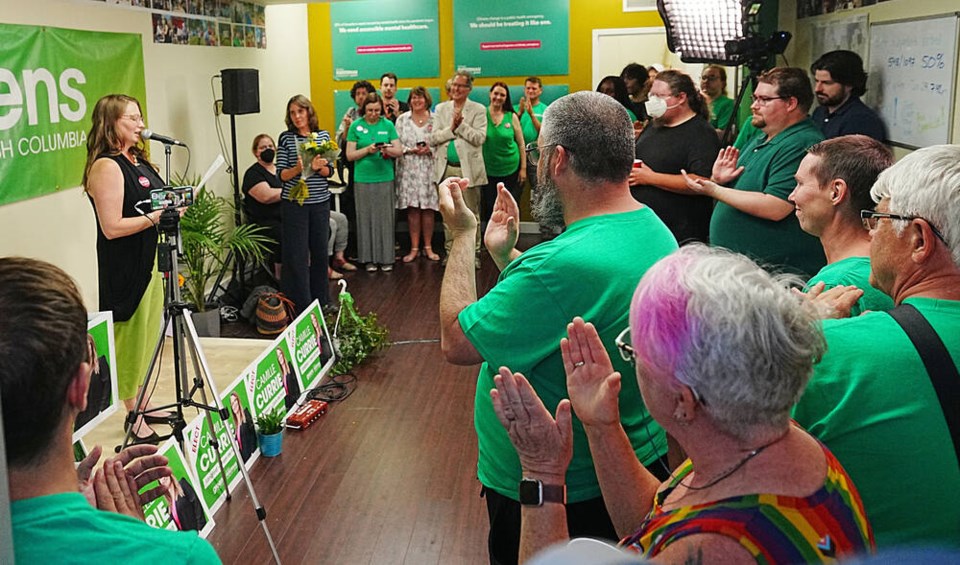Elena Lawson has no doubt why her party struggled to win votes in Saturday’s byelection: brand confusion and low voter turnout.
The B.C. Liberal Party changed its name to BC United in April. Lawson said when she was door-knocking, many asked: “What is the BC United party?”
Lawson figures some of the BC United’s traditional vote moved to the B.C. Conservatives because voters were familiar with the signs and colours of the federal Conservative Party of Canada.
Preliminary results had Lawson finishing in fourth place Saturday with 8.6 per cent of the vote, a drop from 2020 when the B.C. Liberal candidate pulled in 14.9 per cent and placed third.
Lawson, the co-founder of the Children’s Autism Federation of B.C., predicts the uncertainty about the party’s brand will disappear by the time the next general election comes around on Oct. 19, 2024.
The job in coming months is “definitely getting the brand out there and clarifying [it] to people,” Lawson said Sunday.
New Democrat Ravi Parmar swept to victory with 53 per cent of the vote in what had been former premier John Horgan’s riding. The Sooke School District board chair was mentored by Horgan.
After Parmar, the happiest candidate in the Langford-Juan de Fuca election was real estate agent Mike Harris, who placed second with 19.8 per cent of the vote. The party did not run a candidate in the 2020 general election.
Harris said he is “over the moon” and sees the results as a “good building block” for 2024.
He does not agree that the vote was split among the right. “We took the percentage from the NDP. We did not take it from the United party. They weren’t strong here last election.”
Prior to the next election, Harris said, “we’ve got some time here to really resonate more with constituents.”
Citizens are concerned about taxation levels, businesses are worried about survival and social programs are lacking, Harris said.
BC Green Party candidate Camille Currie pulled in 17.6 per cent of the vote and placed third in the race. The 2020 results saw the Green candidate in second place with 16.6 per cent.
Currie, founder of B.C. Health Matters, has announced she will seek the party’s nomination for the 2024 election.
“I will continue to do everything I can to give people the support and opportunities they deserve,” she said.
David Black, a political communications professor at Royal Roads University, said byelection results are often seen as a preview of the next general election — a way of taking the temperature of public opinion.
In this case, it was not surprising the NDP won the riding, which was considered a safe seat for the party.
“The story isn’t so much how the NDP did but how the three main opposition parties fared,” Black said. “What’s very clear from the results is that — and part of this is peculiar to Langford and part of this is a provincial story — is the strength of the Conservatives here and the collapse of BC United.”
Federal Conservative Leader Pierre Poilievre’s populism is clearly helping conservatives across B.C., he said, adding that the other factor is Langford’s somewhat conservative political culture.
“There’s only so much room on the centre-right and the Conservatives are beginning to eat into that base of voters who might have previously voted B.C. Liberal or BC United,” Black said.
BC United “has work to do in terms of the rebrand and establishing who they are and what they are about,” he said.
As the party looks to 2024, Black predicts “they will fall back on what has always been, during the Liberal era, their strongest message, which is: ‘We are the party of fiscal prudence.’ ”
That will see the party talking about inflation, economic anxiety, housing issues and saying that they are here to help.
Following that, “the bigger question going forward is who will the NDP face and how are the parties on the centre-right going to sort out their differences and who is going to lead the anti-NDP opposition,” Black said.
”I think things have gotten more complicated for [BC United Leader Kevin] Falcon.”

